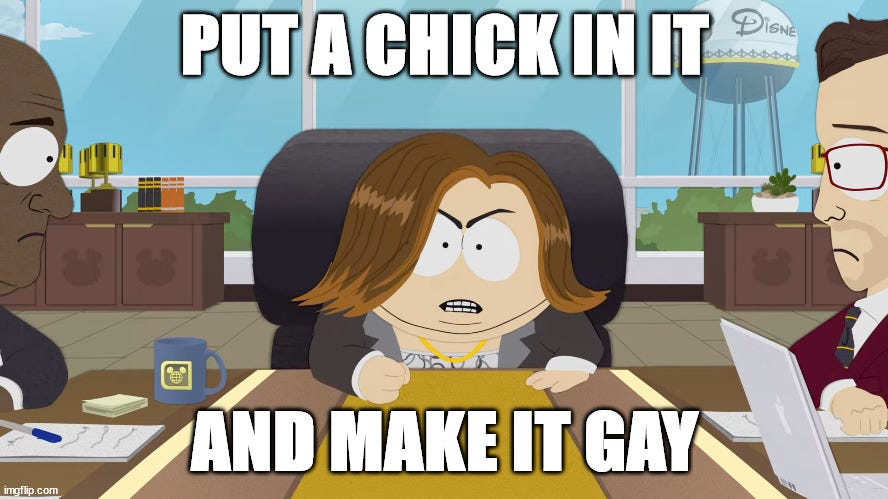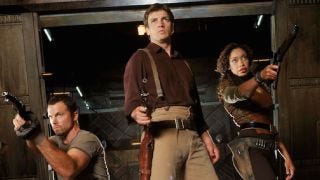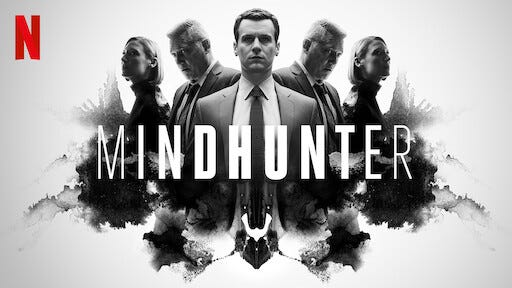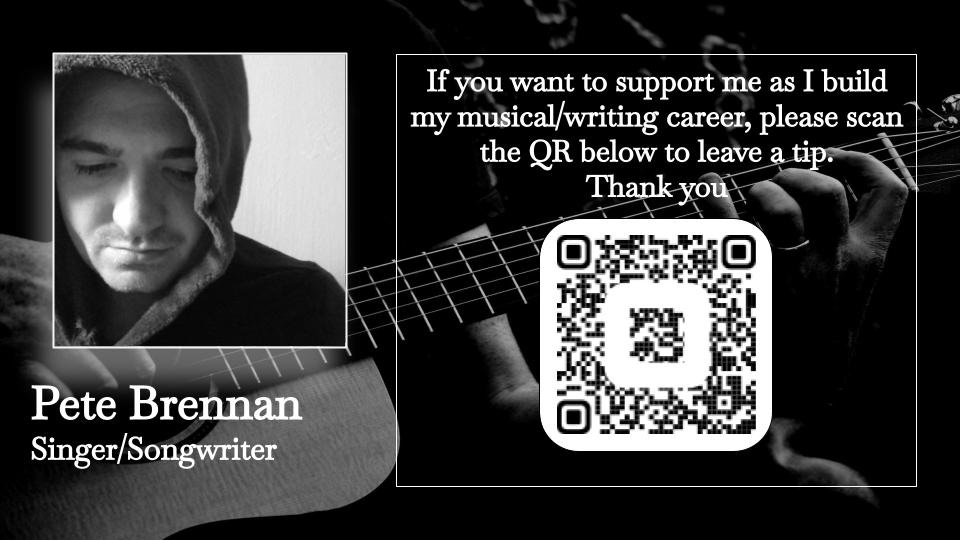Jesus H Christ! There sure is a load of old tosh on the tube these days, ain’t there.
Sure there are a few rare gems that I have seen recently, most notably HBO’s ‘The Penguin’ and Silo, both IPs which were adapted from source material that I was already familiar with and revered, so I know I am biased in that regard.
The occasional diamond of a show like these can still arise out of the postmodernist slop that the big studios are churning out these days to remind us that TV shows can be enjoyable and rewarding experiences. A place where stories can really breath and nurture an investment from the audience, in the way that only a long running TV show can.
But these rare gems are exactly that… a rarity. Scarce, and frustratingly so. I have recently made similar claims about video games and in that article I placed a healthy sum of the blame broadly on ‘wokeness’, and I do for TV also.
Part of this is the ideology itself, as it fundamentally denies reality at every turn which subsequently manifests storylines, characters and entire projects that do not reflect the real world or the people living in it. And those people, (the ones living in the real world), are the consumers. The ones who the TV studios need to tune in to their shows. At least they were, until the shows that were being aired began to less and less reflect their reality and represent their lives as the mind virus spread.
This is best demonstrated by the TV shows that have come out of Science Fiction, Superhero and Action franchises that were historically aimed at men; like Star Wars, Marvel, Star Trek, Doctor Who, The Boys, etc.
The ‘Woke’ like to pretend that men and women are the same and thus interchangeable as they seemingly cannot tell the difference between ‘Equal’ and ‘Identical’ as concepts. Any acknowledgement of difference is seen as ‘othering’ or one side ‘oppressing’ the other. But men and women are different and, whether they like to admit it or not, that manifests in a plethora of ways, including taste in art.
I think the Youtuber Nerdrotic put it best… ‘Women like Wicked, and that’s fine. But we don’t want Star Wars to be Wicked. We want Wicked to be Wicked, and Star Wars to be Star Wars’.
Men like some things, and women like other things. Sometimes the two cross over, but often they don’t. One of the things that men typically tend to like is nerdy, sci-fi/fantasy stuff, like Star Wars.
But for the last ten years, Lucasfilm has tried to make Star Wars about women and for women, and overtly so. Kathleen Kennedy is on record saying so along with coining the maxim ‘The Force is Female’ and has focussed her attention on forwarding female characters, storylines and thematic arcs. But women are not the only minority in the fan base that Kennedy has gone to great lengths to over-represent in recent times though, as Cartman is fond of reminding us.
A similar thing happened with the Marvel Cinematic Universe during its Phase Four, prompting the aforementioned Nerdrotic coining the term ‘M She U’: a term that Marvel has itself acknowledged in a recent publication. They are also seemingly pivoting away from this approach quite hard of late; firing activist employees, shelving overtly woke projects and bringing back the ‘male, pale and stale’ actors from the heyday of their franchise in an attempt to recapture their glory days of box office success.
That is part of the reason that shows like The Acolyte and Agatha All Along failed quite as hard as they did: they were aimed at a target audience that didn’t exist. Sure, some women love Star Wars and Marvel and a lot of others passively watch and enjoy them somewhat. But the vast majority of the fans of these projects are male, just as the vast majority of Wicked & Barbie fans are women.
It should go without saying that I personally have no problem with these properties featuring female characters and stories or them being produced by competent filmmakers who happen to be women. But the actual target audience of a property and their innate tastes and desires cannot be completely ignored without some level of drop in interest in it.
When someone who likes films that feature superhero action (typically men) wants to see that kind of stuff, they’ll likely choose something made by Marvel. But when someone who likes to see a group of women dancing & singing show tunes or sipping wine whilst talking about social interactions (typically women), they’ll probably watch a Musical or Sex & the City. The first group wouldn’t look for Superhero action in Musicals, etc; nor would the second group look for campy theatre stuff in a nerdy Marvel flick.
But’s that’s what Disney+ did with Agatha All Along. They made a show set in a superhero universe full of singing, dancing and characters that sat around drinking wine and chatted about their problems. What on Earth could explain the terrible ratings that show got, I wonder?
To alienate their target audiences even more, these IPs traditionally enjoyed by straight men have been telling those same men they are ‘toxic’ and should be ashamed of their inherent masculinity for over a decade now. And the studios were perplexed that they stopped watching their shows. Crazy, right? Who could have predicted that an audience won’t stick around while being insulted endlessly for a decade and a half? (Oh, that’s right. Quite a lot of us did).
Another reason the ideological cancer of wokeness has facilitated the recent wave of poor storytelling and substandard TV shows, film and video games is DEI initiatives. Put simply, (and to cut a VERY LONG story short), studios stopped hiring on merit in favour of hiring based on social identity markers like race, gender and sexuality.
Instead of hiring the best people for whatever job they were filling (script-writing, directors, cast, etc), they hired based on a Marxist derived points system based on perceived historic oppression and victimhood. Instead of basing their appointments on the ‘content of their character’ or how adept, proficient and experienced they were at their craft; they hired people that fit into a demographic profile.
They cut themselves off from a significant section of the talent pool because of the colour of their skin, sexuality, chromosomes or (let’s be honest) political beliefs. After that, even if they hired only the absolute best from the remaining demographic categories, they still would be hiring from a smaller, more limited pool of talent. Statistical probability would suggest that this means they would necessarily hire lesser skilled candidates, at least on occasion and perhaps even often. The more people a company employs, the greater chance they would have of employing workers who were not the best possible candidates.
The result: a net drop in quality across the board, particularly on those shows whose target audience was straight males. Worse writing. Worse acting. Worse Directing. Worse… everything. And again the studios were perplexed that their audiences fell off and the viewing numbers dropped. Make it make sense, please?
So, what have this straight white male done to satiate his thirst for great TV shows during this Dark Ages of episodic broadcast content? Well for one, I have watched a lot of foreign language shows as they are typically less influenced by Wokeness as it is essentially an American mind virus that is primarily spread via the English language. Shows like Dark, All Of Us Are Dead and Alice in Borderlands.
I have also watched older shows and allowed myself to get nostalgic for TV that was made before the Woke’s long march through our entertainment institutions. Shows that were made by talented teams of filmmakers who knew what they were doing and highly skilled. Filmmakers who cared more about their craft and the art they produced than virtue signalling and political activism.
Shows like the cancelled way too soon Firefly. Joss Whedon is controversial these days and some of the stuff he is accused of is inexcusable, but he was undeniably good at what he did. Firefly has only gotten better with age, especially compared to modern Sci-Fi procedural shows. The same can be said for his more successful franchise, Buffy the Vampire Slayer, a show with a female lead I might add.
I have rewatched Homeland, 24, X-Files, Breaking Bad, Chernobyl and The Expanse. Not to mention older movies and revisiting older, pre-woke videogames.
But one show has had a more profound effect on me than any other; David Fincher’s Mindhunter on Netflix. I loved it the first time around but on this recent rewatch, it broke my heart when I finished Season 2 again knowing that that is it for this show. There is no more. Cancelled.
I ended up revisiting Fincher’s movies after as I had quite forgotten that film/TV could be this good. Flawless, engaging, well acted and made. Brilliant scripts, expertly brought to life by talented actors. Relatable characters with understandable problems, motivations and genuine arcs.
I rewatched several of his movies last week and when I got to Zodiac (by route of Fight Club, Girl with the Dragon Tattoo, Se7en and Gone Girl) I asked myself ‘How does a director this good get a TV show cancelled?’ And a TV show as good as Mindhunter at that?
Why does Mindhunter get cancelled so early while Star Trek Discovery gets five bloody seasons before getting canned? I never watched it because I’m not a Trekkie but I do know a few, and they all HATE it. The ratings and reviews have increasingly left something to be desired too. But it only just recently got the axe.
Well, part of that is the Firefly problem; not enough people watched Mindhunter. That makes me sad, but I get it. The money has to be there, the viewers. It would be hypocritical of me to say that the studios should dump wokeness because of ‘brokeness’, and then advocate for the return of a show that had poor viewership.
But the difference is because we need TV like Mindhunter to raise the bar. To show a new generation of filmmakers just how good TV can be. To inspire them into wanting to make future shows of the same quality and to keep this proud tradition alive. To add to our culture.
I argue there is a value in art outside of the financial that is unique to it and has to be considered alongside monetary gain: its cultural relevance, both now and more importantly in the future. The art we leave behind for our descendants, the stories we tell; they are our legacy. They will outlive us and allow future generations to learn about us; to remember us. Our works of art are our voice; a record of our existence preserved in time, but they don’t belong to us.
The works of Plato, Shakespeare, Michelangelo, Aesop, the Bible: they all belong to us just as much as they did to those alive when they were created and will belong to those in the future. They have inspired countless new artists in the past and will inspire countless more in the future, as long as we don’t destroy them all with soup or orange paint.
And the works we create now could be the same, as long as they are good enough to survive the history yet to be written.
That’s where I think we have gone wrong with our pop culture of late. We have no balance between art as an academic discipline, (an expression of our humanity) and art as a business. On TV, we have bounced from one extreme to the other and ended up with a similar result. Money or the artist’s vision, rather than trying to find a way to blend the two in unison.
On one extreme, people are focussing exclusively on viewership and the money a show makes. They are only looking at the numbers and good shows end up getting cancelled because they are not hits.
On the other extreme, creators are ideologues who are mostly concerned with pushing their own philosophical ideas in their art at the expense of entertainment. Their shows don’t make any money because they are too ideological and thus alienate mass audiences.
In both cases, we end up with low quality TV, like the Rings of Power. (Sorry, I had to get that in).
Artists will always be political, ideological and have their own philosophies, and they will always be inspired to insert this stuff into their work. That is part of being an artist, maybe even the biggest part.
And investors and CEOs will always want to make as much money as they can from their product.
Shows need to appeal to as large an audience as possible to appease the shareholders. But if they just fill it with recycled tropes, cliches and fashionable nonsense like Disney+ do, their audience will vanish as there is no art in it, no cultural relevance, no representation of the people’s voice. This kind of stuff tends to leave no lasting expression on the culture and is forgotten before too long.
This is true of the woke shows I mentioned above but is equally true of firework show movies like the Avatar movies, I would argue. All style, no substance: pretty colours and loud noises that entertain an audience for a couple of hours and then are completely forgotten by the morning.
Conversely, if every show is some preachy, avant garde and sanctimonious drivel but lacking in entertainment, they won’t retain their audience longterm or make any money. Those shows too will fade into the void annals of time.
I think we need a happy medium, somewhere in the middle. What that looks like, I have no fucking clue. I just don’t want to fall in love with another show that gets cancelled after two seasons. Whatever world brings Mindhunter back, that’s the world I want to live in.
Please Netflix, give David Fincher whatever the hell he wants to bring it back for a Season 3. And if you have a spare $300 million dollars lying around, a season 2 of Firefly wouldn’t go amiss either. You know, to save culture.
Thanks for reading,
The Common Centrist.














Actor here, I'll one more thing to this brilliant article:
The first rule of writing is that all the rules are there to be broken - but first you must know and be able to obey those rules before you can break them.
Most modern film/TV skips that rather important step, and the result - trash.
For reference to some of those rules:
Causality in time travel (see The Licaniua Trilogy)
The three act structure
The laws of magic (see Branson Sanderson's essays on the subject)
But the BEST stories should feel like they are inevitable conclusions of the actions of the characters therein, have just finished book 3 of the Tyrant Philosophers and that's absolutely the case in those books.
Growing up among boys, I’ve always had a “different” taste in shows. My favorite superhero has always been Batman, and I know Star Wars in and out, as well as Marvel, in which my favorite character is Daredevil, the one from Netflix. I hated that Agatha show. I didn’t even finish it. Not because I don’t enjoy a rom-com, but because of the feeling of being stuffed with a political agenda in the most annoying possible way.
By the way, where do you find the time to watch any TV? 🤪
As always, I couldn’t agree more with you. Thank you! 😊